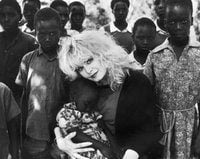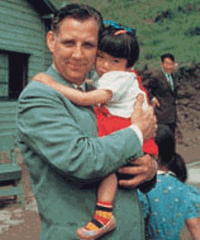Chris Horst and Peter Greer have a terrific book out now called Mission Drift. I asked whether they might share something with the Patheos audience connected to the book, and they were generous enough to supply the following. Enjoy!
*
Mission Drift at the World’s First Child-Sponsorship Organization
By Chris Horst and Peter Greer
 We grew up watching those Sally Struthers infomercials. They were gripping and helped awaken a nation’s conscience. Struthers would do video pleas from impoverished places, drawing attention to some of the most pressing humanitarian crises around the world.
We grew up watching those Sally Struthers infomercials. They were gripping and helped awaken a nation’s conscience. Struthers would do video pleas from impoverished places, drawing attention to some of the most pressing humanitarian crises around the world.
Her infomercials followed a fairly standard script. She went to dire places — those wrought with hunger, recovering from conflict and existing on the edge of catastrophe. Haunting images of skin-and-bones children with bloated bellies stirred viewers to respond and to give.
But it wasn’t till recently that we actually learned more about the organization Struthers encouraged us to give to. What we learned was bittersweet. Though the organization still continues to provide important humanitarian relief around the world, it hardly resembles the organization its founder created.
Wars wreaked havoc throughout the world in the early 1900s. In response, American Good Samaritans created a number of nonprofits to address the suffering, disease, and poverty they saw. World Vision, Compassion International, CARE and many of the world’s largest global relief agencies launched during the first half of the twentieth century.
They have brought indescribable hope and good to the world’s vulnerable people. But in our opinion, not all are doing what their founders created them to do.
Organizational Identity Crisis
 Dr. J. Calvitt Clarke, a Presbyterian minister, founded China Children’s Fund in 1938. The first outreach from his new organization was to Chinese children in response to the orphan crisis following the Sino-Japanese War. Clarke was a man of deep convictions about the poor.[1] He sought to help them more than just materially, however. He held deep faith convictions and cemented the importance of his faith in the very name of his organization. The ministry expanded and changed its name to Christian Children’s Fund.
Dr. J. Calvitt Clarke, a Presbyterian minister, founded China Children’s Fund in 1938. The first outreach from his new organization was to Chinese children in response to the orphan crisis following the Sino-Japanese War. Clarke was a man of deep convictions about the poor.[1] He sought to help them more than just materially, however. He held deep faith convictions and cemented the importance of his faith in the very name of his organization. The ministry expanded and changed its name to Christian Children’s Fund.
To fund the efforts, Clarke invented child sponsorship, an innovative approach built around connecting donors directly to individual children. Clarke’s organization escalated to charity celebrity status. By 1994, the organization served nearly two million children through child sponsorships with a budget of over 100 million dollars.
But by the 1990s, Christian Children’s Fund’s very identity was called into question. In an interview with Christianity Today, Thomas Naylor, a former board member, said, “This organization has nothing to do with Christianity.”
Its president, Anne Goddard, acknowledged the change in the identity of the organization: “An organization changes slowly, and then all of a sudden you realize the changes have happened so much that you need to step back and [see if you are] putting out the name that really reflects who you are.”
In 2009, it changed its name to ChildFund International, a final acknowledgement that it had abandoned any trace of the Christian mission in its founding by Dr. Clarke.
The Second Presbyterian Minister
 Just over a decade after Clarke founded China Children’s Fund, a fellow Presbyterian minister, Everett Swanson,[2] visited orphans in war-torn Korea. At the time, the Koreans were a people uprooted — broken by the horrors of war. Swanson grieved that war had ravaged the country, propelling millions into abject poverty. Specifically, he lamented the plight of Korean children.
Just over a decade after Clarke founded China Children’s Fund, a fellow Presbyterian minister, Everett Swanson,[2] visited orphans in war-torn Korea. At the time, the Koreans were a people uprooted — broken by the horrors of war. Swanson grieved that war had ravaged the country, propelling millions into abject poverty. Specifically, he lamented the plight of Korean children.
Swanson walked the streets of Seoul daily, praying for these hurting children. One morning, with the cold air stinging his face, Swanson saw policemen scoop up piles of rags from a street corner. As he walked closer, he realized these were not rags, but orphans who had died in the freezing conditions overnight. Swanson couldn’t rid his mind of the images.
This experience planted the seeds of Compassion International. In 1952, Swanson, and the passionate sponsors he recruited, provided food, education, clothing, and spiritual nourishment to a group of 35 orphaned and vulnerable children in Korea. Today, Compassion International serves over 1.3 million children across twenty-six countries.
Reverend Everett Swanson knew his purpose. He founded Compassion to provide for the social, material, and spiritual needs of at-risk youth around the world. Today, over sixty years later, Compassion precisely embodies Swanson’s convictions. And their commitment to sharing that has not waned. It has only grown more resolute as Compassion has aged.
According to ChildFund’s president, Anne Goddard, ChildFund “phased out the religious education part of its mission years ago.” Wess Stafford, who just recently retired as Compassion’s president from 1993-2013, says just the opposite.
“I can think of many Christian organizations that have lost their spiritual commitment,” said Stafford. “Any leader who inherits a strong Christian commitment must shepherd the culture and steward that commitment.”[3]
Despite facing an onslaught of pressures to drift from its founding identity, Compassion hasn’t backed down from its core purpose of meeting not only the material, but also the spiritual needs of children.
They are the exception.
Slowly, silently, and with little fanfare, organizations routinely drift from their purpose, and most will never return to their original intent. This is evidenced by the well-known stories of Harvard, Yale, the YMCA and many other prominent faith-based organizations that today hardly resemble the organizations they were founded to be.
Harvard’s founding mission statement was “To be plainly instructed and consider well that the main end of your life and studies is to know God and Jesus Christ.” The YMCA began with Bible studies and prayer meetings in London. It was one of the largest missionary agencies in the world just fifty years ago.
I (Peter) did my graduate studies at Harvard and we both have enjoyed exercising at the local Y. Our contention is not with the institutions they are today. It’s with the institutions they are not. Today, though these organizations continue to contribute to our society in wonderful ways, they scarcely resemble what their founders envisioned.
This is mission drift. In our research we found that without careful attention, faith-based organizations inevitably drift from their founding mission. It’s that simple. It just happens.
The contrasting stories of Compassion and ChildFund provide a case study in what it takes to protect an organization’s core identity.
On the surface, Christian Children’s Fund and Compassion International look like twins. They were founded just fourteen years apart. Both were started by Presbyterian ministers, each with a passion for helping the poor. Both founders had missionary friends who encouraged them to start their organizations. Both were born to help children orphaned after wars in Asia, one in China and the other in Korea. Both use child sponsorship to fuel their missions.
Yet, the reason Swanson founded Compassion is the reason Compassion exists today. Compassion has remained mission true. Their story gives us great hope. They figured out how to protect their mission. They understood their Christian identity and built safeguards around it.
While we read the stories of their foundings, we couldn’t believe the parallels. These two organizations could not have started out more similarly. And today, both are among the 100 largest nonprofits in the country. But they now look radically different. One — ChildFund — stripped “Christian” from its very name. The other — Compassion—beats to the same heartbeat as its founder.
Today, the majority of organizations founded with a Christian identity are following ChildFund’s slow drift, while a few brave leaders are charting a different course.
For leaders and supporters, what path are the organizations you care most about following?

 Peter Greer and Chris Horst are the coauthors of Mission Drift, a book about the importance of faith-based organizations retaining their religious identity as they grow and professionalize. Greer and Horst serve as executive leaders of HOPE International, a Christian faith-based microfinance organization.
Peter Greer and Chris Horst are the coauthors of Mission Drift, a book about the importance of faith-based organizations retaining their religious identity as they grow and professionalize. Greer and Horst serve as executive leaders of HOPE International, a Christian faith-based microfinance organization.
Contact info:
Chris Horst | chorst@hopeinternational.org















